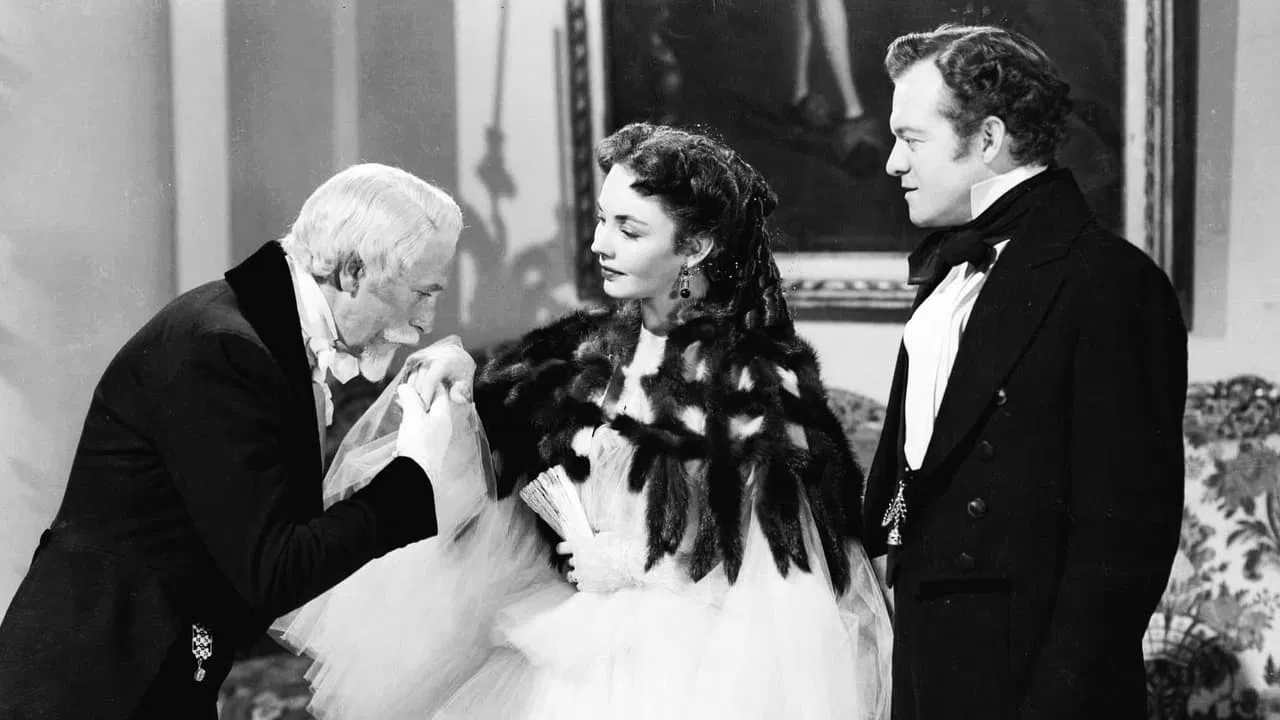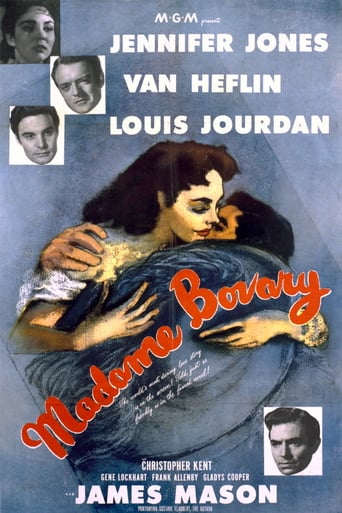

Emma (played by the beautiful Jennifer Jones) marries Charles Bovary, a doctor, thinking that he will propel her into society. It turns out he is a bore and isn't the dashing man she had hoped for. She does what she can to make him into something she wants, but it's not in him. He isn't even a very good doctor. Soon Emma is having affairs with various men. She goes about, flirting with these rich men, who accept her advances because she is so beautiful. She is also a sexual creature, so she hooks up with those whose intentions aren't the most honorable. The acting is very good and Jones lights up the screen, scandalous as she is, she is a dominating presence on the screen. It doesn't do justice to Flaubert, but it's still excellent.
... View MoreIt is an undeniable fact that French writer Gustave Flaubert's classic "Madame Bovary" is very much a French work of art.This is the reason why acclaimed French directors Jean Renoir and Claude Chabrol have filmed their own versions of this classic tale which not only focuses on adultery but also gives a very vivid and accurate description of peasant life during eighteenth century France.However, American director Vincente Minelli's version is very much different from these Gallic versions as it is quite down to earth with an elusive American touch to it.This is something which makes it very much universal in its appeal and reach.It is really pure joy to see acclaimed American actors Ms. Jennifer Jones and Mr.Van Heflin playing their main roles as Emma Bovary and Charles Bovary.However,James Mason can be touted as this film's absolute real star for his marvelous performance as French writer Gustave Flaubert.It is he who carries the film on his shoulders by making viewers empathize with Emma Bovary's hapless plight.He is one of the primary keys to suggest that his work "Madame Bovary" is a work of our modern times to know how one should view male/female relationships especially relationships which are the cornerstone of all married people's relationships.
... View More"What you try and create," the director Vincente Minnelli once said, "is a little magic". Like Madame Bovary, Minnelli's crime, if he had one, was wanting things to be beautiful. Producer Pandro S. Berman knew what he was doing when he hired Minnelli to shoot this adaptation of Gustave Flaubert's classic novel. Classic-era Hollywood was saturated with stories of apparently selfish women who ruin the men in their life, but Madame Bovary differs in that it gets us to understand and sympathise with its tragic heroine, even drawing parallels to our own desire for escapism through literature or cinema. And in the 1940s few pictures were as escapist as those of Minnelli.When you look at a Minnelli picture, his visual style is all about framing and defining beauty, be it Judy Garland singing at her window, a spectacular Ziegfeld stage set or recreations of fin-de-siecle artworks. For him, exquisite imagery was not simply a gloss – it was an aesthetic ideal that was at the heart of cinema. Yet for this picture, he frames beauty within the dreariness of reality, for example showing Jennifer Jones gazing out of the window of her dingy attic room on a glorious summer's day. But what is significant is that no matter how desperate the circumstances get, no matter how dark or cramped the interiors become, Jones is always magnificently dressed, and there is always somewhere a window onto a better world. In other words, he doesn't allow us to lose respect for the character or her romantic idealism. The real world may let us down, Minnelli seems to be saying, but he won't allow the concept of beauty itself to be dragged through the mud.The trouble with this version of Madame Bovary – and this is something common to many book-to-film adaptations – is that it is extremely bitty and repetitive. Novels are after all intended to be picked up and put down, whereas motion pictures must be swallowed in a sitting. Minnelli's flowing style may be designed to keep the audience constantly engaged on a visual level, but story-wise it is less likely to hold our interest. The acting performances are not exceptional – at least not by the standards of Jones and Heflin, and in any case we are not really able to focus on them within Minnelli's technical sweep.What we have here then is an adaptation that fails to assemble coherently the bones of the plot, but captures the essence of Flaubert's work and exhorts us to sympathise with the protagonist. The picture opens with a historical scene in which the author, played by James Mason, defends his creation by defending its heroine. This introduction as much as states that it is not enough to read what Emma did; we must understand why she did it. In this respect, Minnelli's Madame Bovary is a success on its own terms.
... View MoreJennifer Jones is "Madame Bovary" in this 1949 adaptation of Flaubert's novel, directed by Vincente Minnelli and also starring Van Heflin, James Mason, Louis Jourdan, Gene Lockhart, Alf Kjellin and Ellen Corby. The film starts with Flaubert, on trial for indecency. As he defends the book, he tells the story of Emma Bovary, a delusional young woman living on a farm who, from romantic novels, has unrealistic ideas about love and happiness. She nabs a simple country doctor (Van Heflin) and proceeds to buy herself an incredible wardrobe and live as a rich woman, even though she and her husband are not wealthy. She has a little girl whom she ignores, leaving her to the nurse (Corby). Emma soon becomes bored and attempts to seduce a young man (Kjellin), but his mother (Gladys Cooper) catches on and sends him to Paris. Then she meets Boulanger (Jourdan) at a party, becomes his lover and plans to run away with him to Italy - but he sees what high maintenance she is and takes off without her. In an attempt to make her husband more prominent, she attempts to talk him into performing a new surgery, but he refuses (in the book, however, he's ambitious as well and does the surgery, which is a failure). Meanwhile, unbeknownst to her husband, she owes a fortune, and if she doesn't find a way out, the family is due to lose their home and furnishings."Madame Bovary" is one of the most stunning films ever made, with a captivating performance by Jones who makes Emma pathetic, desperate, frantic and sympathetic. As one of the comments on the board pointed out, it's easy to make Emma unlikable. With Jones' natural charm making her likable and somewhat sweet, we can see ourselves in Emma. She has great backup from Heflin as her cowed husband. Jourdan is handsome and arrogant - he sees his future with Emma, and he doesn't like it.Minnelli handles every detail beautifully in this film. Not enough can be said about the waltz at the party, its dizzying effects making it one of the most thrilling scenes on film. When Emma later puts on the same gown and looks in the mirror and remembers that night, we know for her it was the ultimate dream evening, when she become one with the heroines of the novels she read. The gowns - well, there have been beautiful gowns in films - the 1938 Marie Antoinette comes to mind - and, as in that film, these gowns are works of art, particularly the white ball gown. When Boulanger returns from Italy, and Emma goes to see him, she actually looks different - tired and older - the subtlety of the makeup is spectacular.Though set in France in the mid-1800s, Madame Bovary is a classic because it deals with an ordinary person so dazzled by illusion that she cannot accept anything about her life as it exists. How apropos for today, when the media bludgeons us with multimillion dollar homes, heiresses who go to parties every night, size zero, red carpet premieres - it's hard to be happy when you're a housewife in sweats paying $4 a gallon for gas. Even before films, television, the tabloids and the Internet, people weren't satisfied with their lives because they were told to compare their inside with someone else's outside and found themselves not measuring up."Madame Bovary" isn't an immorality tale, it's a morality tale and, of course, Flaubert was acquitted. It's considered one of the two greatest novels ever written, along with Anna Karenina, and it's perfectly adapted for film in the 1949 version - the story of a woman who thinks that shopping on credit till she drops is the way to real happiness. Like many in the 20th and 21st centuries have found, she was wrong.
... View More